外研版八年级上册Module 4 Planes, ships and trains . Unit1课件 (共31张PPT,内嵌音频
文档属性
| 名称 | 外研版八年级上册Module 4 Planes, ships and trains . Unit1课件 (共31张PPT,内嵌音频 | 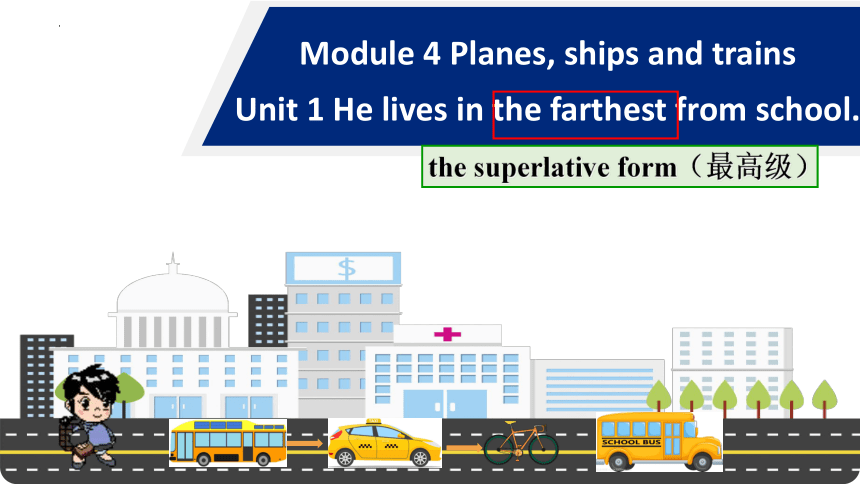 | |
| 格式 | pptx | ||
| 文件大小 | 27.3MB | ||
| 资源类型 | 教案 | ||
| 版本资源 | 外研版 | ||
| 科目 | 英语 | ||
| 更新时间 | 2022-10-24 22:39:08 | ||
图片预览

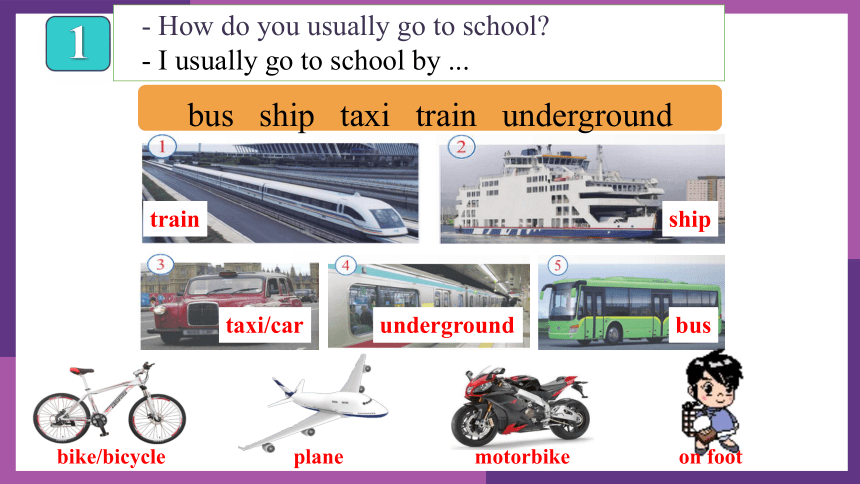
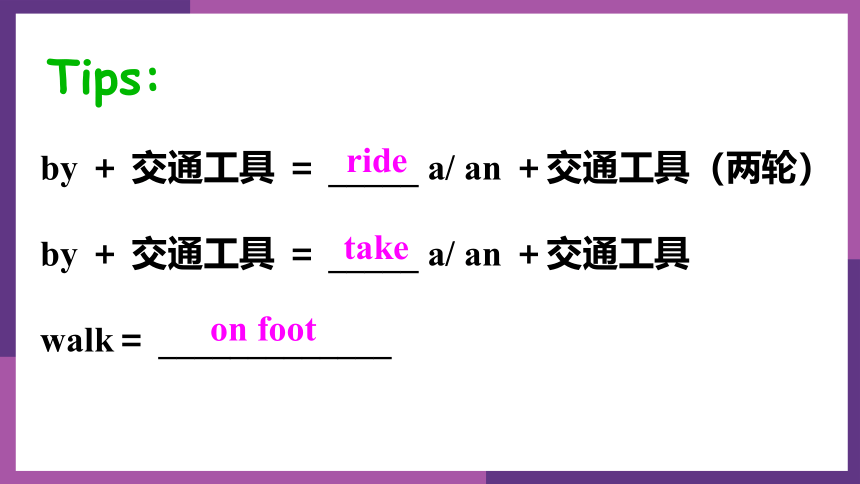
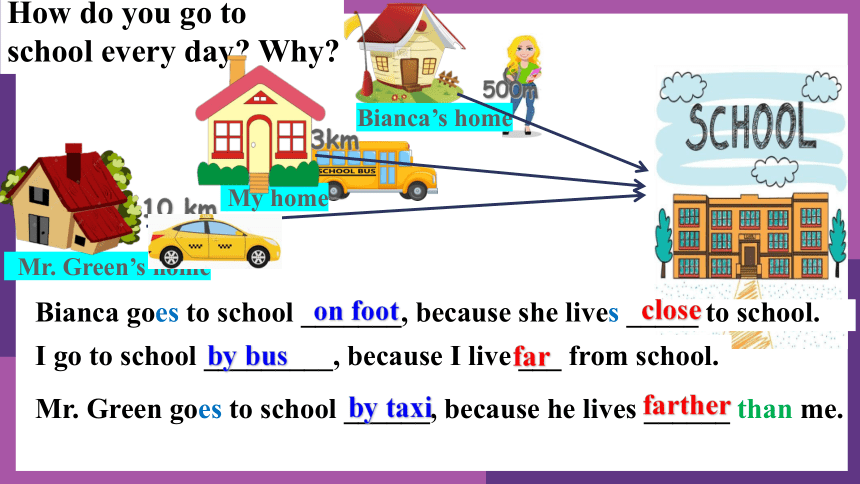
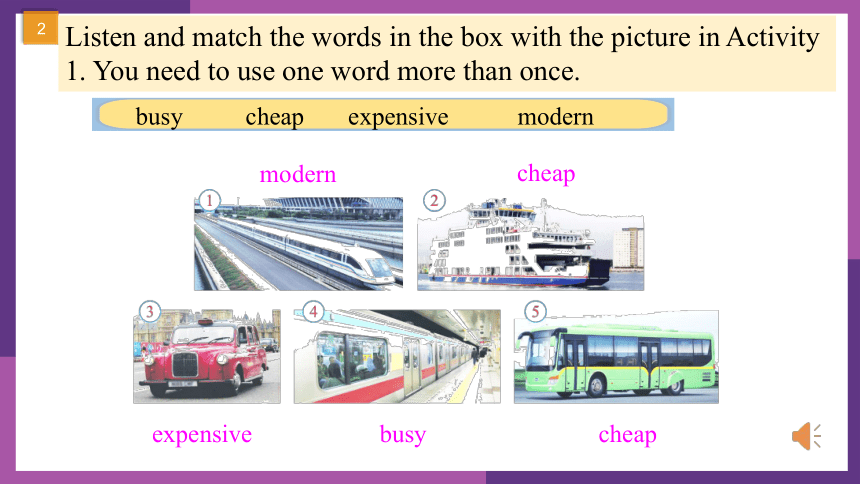

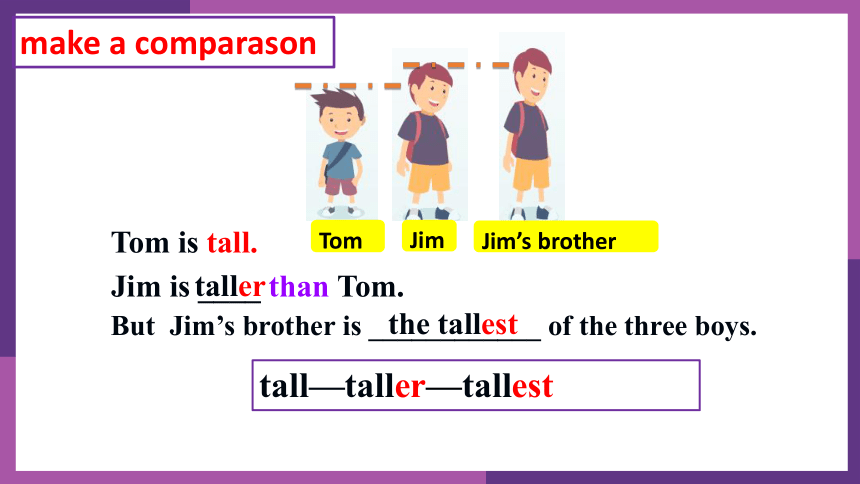
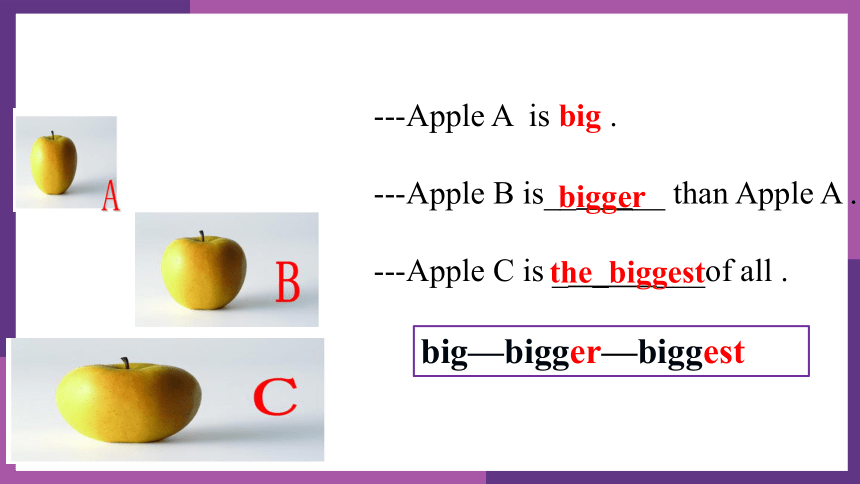
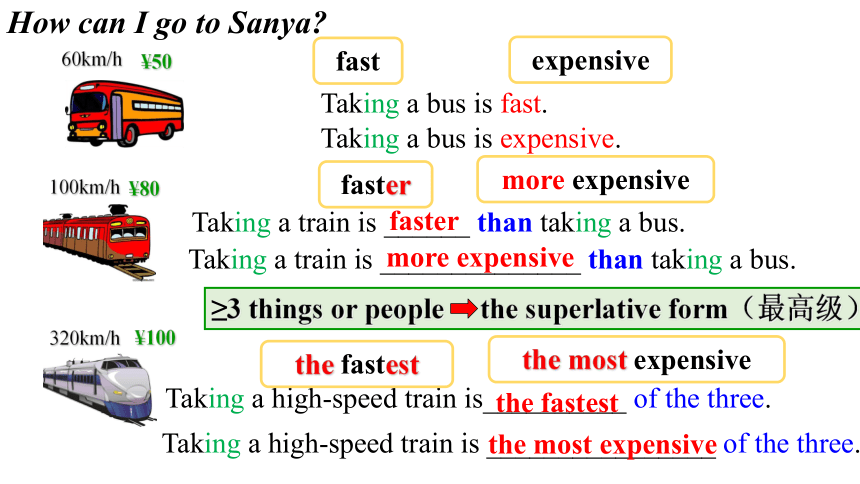

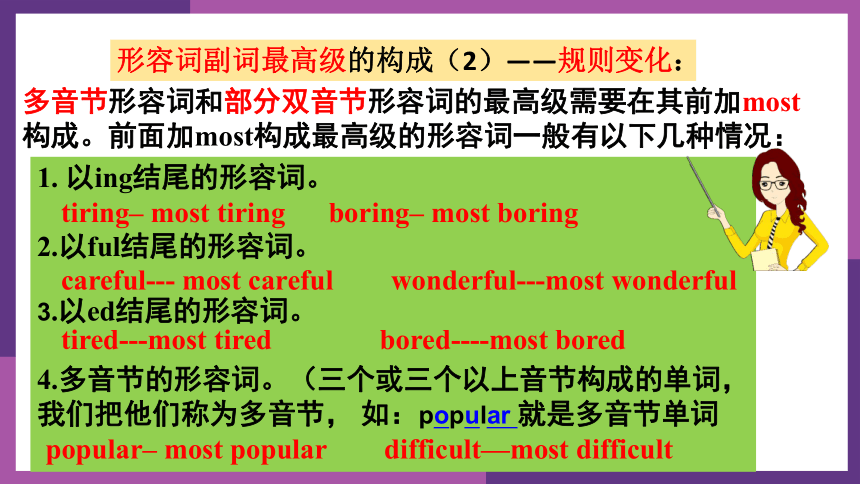
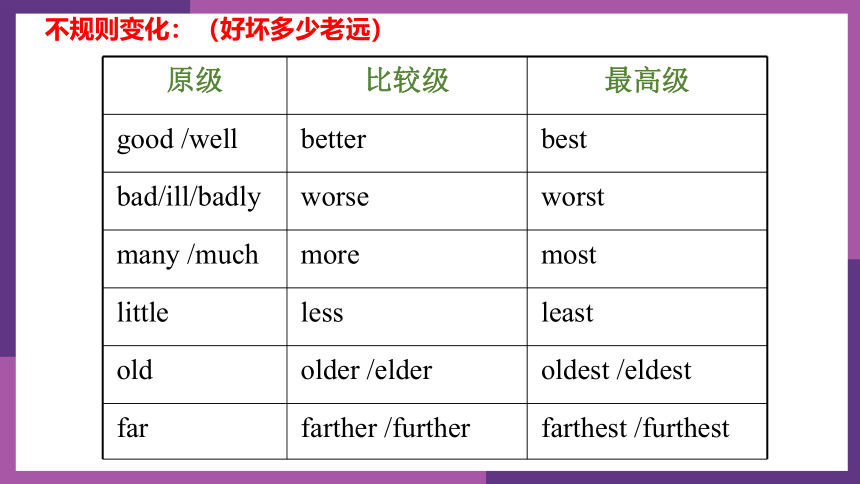
文档简介
(共30张PPT)
Module 4 Planes, ships and trains
Unit 1 He lives in the farthest from school.
the superlative form(最高级)
Match the words in the box with the pictures.
1
bus ship taxi train underground
bus
ship
taxi/car
train
underground
- How do you usually go to school
- I usually go to school by ...
bike/bicycle
plane
motorbike
on foot
by + 交通工具 = _____ a/ an +交通工具(两轮)
by + 交通工具 = _____ a/ an +交通工具
walk= _____________
Tips:
ride
take
on foot
How do you go to school every day Why
500m
Bianca’s home
My home
Mr. Green’s home
10 km
3km
Bianca goes to school _______, because she lives _____ to school.
on foot
close
I go to school _________, because I live ___ from school.
by bus
far
Mr. Green goes to school ______, because he lives ______ than me.
by taxi
farther
busy
cheap
cheap
expensive
modern
2
busy cheap expensive modern
Listen and match the words in the box with the picture in Activity 1. You need to use one word more than once.
Listen and fill the dialogue
busy cheap expensive modern
Listening
Boy: What's the most modern train in the world now
Girl: Mm... I think it's the_______________ .
Boy: What's the most expensive way to travel around London
Girl: Maybe it's_________________ .
Boy: What's the cheapestway to travel around Beijing
Girl: _________________.
Boy: What's the busiest underground in the worid
Girl: I think it's the Tokyo _________________.
Boy: What's the cheapest way from England to France
Girl: Mm... Train
Boy: Sorry, it's _________________.
Shanghai airport train
by taxi
The bus
underground
by ship
比较三个或三个以上的事物时,可用形容词或副词的最高级形式来表达。
其规则的变化形式有两种:
1.单音节和少数双音节词在词尾加-est;
2.多数双音节和多音节单词在词前加most。
注意:形容词的最高级前要加定冠词the。
Tom is tall.
Jim is ____ than Tom.
taller
tall—taller—tallest
Tom
Jim
Jim’s brother
But Jim’s brother is ____________ of the three boys.
the tallest
make a comparason
---Apple A is big .
---Apple B is__ ___ than Apple A .
---Apple C is _ _ ___of all .
bigger
the biggest
big—bigger—biggest
How can I go to Sanya
60km/h
100km/h
320km/h
fast
faster
Taking a bus is fast.
Taking a high-speed train is__________ of the three.
Taking a train is ______ than taking a bus.
faster
the fastest
the fastest
expensive
the most expensive
more expensive
Taking a bus is expensive.
Taking a high-speed train is ________________ of the three.
the most expensive
Taking a train is ______________ than taking a bus.
more expensive
50
80
100
≥3 things or people the superlative form(最高级)
单音节和部分双音节词 一般在词尾加-est tall→tallest
long→longest
以字母e结尾的词,在词尾加-st fine→finest
late→latest
重读闭音节词且词尾只有一个辅音字母,双写辅音字母再加-est big→biggest
thin→thinnest
以“辅音字母 + y”结尾的双音节词,先把“y”改为“i”再加-est easy→easiest
busy→busiest
形容词副词最高级的构成(1)——规则变化:
1. 以ing结尾的形容词。
2.以ful结尾的形容词。
3.以ed结尾的形容词。
4.多音节的形容词。(三个或三个以上音节构成的单词,
我们把他们称为多音节, 如:popular 就是多音节单词
多音节形容词和部分双音节形容词的最高级需要在其前加most构成。前面加most构成最高级的形容词一般有以下几种情况:
tiring– most tiring boring– most boring
careful--- most careful wonderful---most wonderful
tired---most tired bored----most bored
popular– most popular difficult—most difficult
形容词副词最高级的构成(2)——规则变化:
不规则变化:(好坏多少老远)
原级 比较级 最高级
good /well better best
bad/ill/badly worse worst
many /much more most
little less least
old older /elder oldest /eldest
far farther /further farthest /furthest
Superlative degree
far
comfortable
close
popular
easy
relaxing
boring
safe
expensive
the farthest
the most comfortable
the closest
the most popular
the easiest
the most relaxing
the most boring
the safest
the most expensive
1.How did Betty go to school today
A. by taxi
B. by bus
C. ride a bike
2. How will Betty go to school tomorrow
A. Take a bus.
B. Take a taxi.
C. Ride a bike.
Listen and choose
√
√
Why was Betty late for school
Read and think
There was a road accident, and the traffic was very heavy.
What happened
But nobody was late, except me.
Was Betty the only one who was late for school
What does Betty’s mum think of going to school by bike
She thinks that’s a good _______,but a bit _____________. Because there’s so much_________.
What does Betty’s mum think of going to school by taxi
She thinks it’s ________________________, but it’s also _________________ way. And taxis are ____ in heavy traffic too.
reading
the most comfortable way
the most expensive
slow
choice
dangerous
traffic
But most of my classmates ride bikes, and it’s quite safe:
Don’t worry. I’ll be cafeful.
What does Betty’s mum think of going to school by taxi
She thinks it’s ________________________, but it’s also _________________ way. And taxis are ____ in heavy traffic too.
the most comfortable way
the most expensive
slow
Name Ways to go to school
Betty
/
Tony
Lingling
Daming
/
by bus/take a bus
by underground/
on foot/walk
by bus/take a bus
Reasons to choose this way
He lives the farthest from school.
Her home is the closest to school.
complete the table
A: How does ... go to school
B: She/He goes to school ... / She/He ... to school.
A: Why does ... go to school ...
B: Because ...
take the underground
Complete the sentences with the correct form of the words in the box.
4
The _______________ way to go to school is by taxi.
Tony lives the ________ from school.
Lingling’s home is the ________ to school, so she always walks.
For Betty, going to school by bike is the ____ choice.
most comfortable
farthest
closest
best
close comfortable far good
1. happen vi. 发生
What happened (to sb)
What’s happening
发生了什么?
发生了什么? (正在发生)
某人发生了某事。
sth happen to sb
(1)
(2)
Tom今早发生了车祸。
e.g.
A car accident happened to Tom this morning.
(3)
sb happen to do sth
碰巧做某事。
我在昨晚的派对上碰巧遇见他了。
I happened to meet him at the party yesterday.
2. But nobody was late, except me.
(1)except“除……之外”,后面可接名词、代词、v.-ing形式、
副词、介词短语和从句等。
e.g. We have an English lesson every day except Saturday.
除星期六外,我们每天有一堂英语课。 (星期六不上)
(2)besides“除……外,另外还有”,着重“另外还有”。
e.g. Besides English, he has to study German.
除了英语,他还要学德语。(学英语)
We will go to zoo tomorrow except our teacher.
Besides our teacher, we will go to zoo tomorrow.
= as well as
3. He lives the farthest from school, so he takes the underground.
他住得离学校最远,因此他乘坐地铁。
far adv. “远;遥远”;
adj. “远的;遥远的”
① be far from 意为“离……远”。
Juliet’s home ____ quite _____ _____ her school.
朱丽叶的家离她的学校非常远。
The church is close to the school.
② how far 意为“多远”,用于对______进行提问。
[拓展] far--farther--farthest
far--further--furthest。
is far from
距离
be close to... 离…很近
4. But it’s so crowded!
The supermarket is very crowded on weekends.
周末这家超市很拥挤。
The room was crowded with guests.
房间里挤满了客人。
crowded adj. 拥挤的;人数过多的
crowd n. 人群;群众
the crowd 群众;老百姓
crowds of people 成群的人
5.You can ride your bike to school, but remember to be careful all the time.
all the time 一直;不断地
e.g. My parents are busy all the time.
我父母总是很忙。
She worries about her son all the time.
她一直担心她的儿子。
Complete the sentences with the words or expression in the box.
5
All the students take the bus to school ________ Sam.
The ___________ train in the world is the Shanghai airport train.
I saw a(n)________on my way to school yesterday.
I do not take the bus to school because it is usually very ________.
except
most modern
accident
crowded
accident crowded except most modern
be late for
what happened
a road accident
don't worry
in heavy traffic
a good choice
far from
be close to
the same as
remember to do sth
all the time
迟到
发生什么事了
道路事故
别担心
交通堵塞
不错的选择
远离
靠近,离...近
和...一样
记得要做某事
一直
Underline the key phrases
反义:
be different from...
Betty _______ today because she went to school ______, but there’s _____________, so the traffic was _____. Then she wants to go to school ______. It’s the most comfortable way but it’s also _________________way and it’s slow in heavy traffic too. At last, she decides to go to school _______. But her mother thinks that it is ______________, so Betty promises ____________all the time.
Tony takes ______________to school because he lives ________________
school. Lingling ______to school because she lives ______________school. And Daming goes to school ______ just like Betty.
was late
by bus
by taxi
the most expensive
a road accident
a bit dangerous
to be careful
an underground
the farthest from
walks
the closest to
by bike
by bus
heavy
Summary
英文中的重读规则:
实词重读,虚词/结构词
轻读。
Listen and underline the words the speaker stresses.
6
1. -Who lives the closest to school
-Lingling lives the closest.
2. -What is the most comfortable way to go to school for Betty
-By taxi.
实词:本身具有意义的词,
如主要动词、名词、形容词、副词和否定助动词。
Name How How long How much What
Mr Su by bike 10 minutes 1.5 yuan the fastest/healthiest
Group work: Make a survey about the ways to school
A: Hey, xxx. How do you usually go to school
B: I usually ... to school./ I usually go to school by ...
A: How long does it take
B: It takes me about ... to get to school.
A: How much do you spend
B: I spend ...
Make a report
A: Hi, everyone! Let me tell you the ways we go to school. In my group, xxx usually goes to school by ... It takes him/her ... minutes to get to school. And he/she spends ... yuan on it. He/She thinks it’s the ... way to school.
B/C/D ...
Name How How long How much What
Mr Su by bike 10 minutes 1.5 yuan the fastest/healthiest
the fastest
the most expensive
Module 4 Planes, ships and trains
Unit 1 He lives in the farthest from school.
the superlative form(最高级)
Match the words in the box with the pictures.
1
bus ship taxi train underground
bus
ship
taxi/car
train
underground
- How do you usually go to school
- I usually go to school by ...
bike/bicycle
plane
motorbike
on foot
by + 交通工具 = _____ a/ an +交通工具(两轮)
by + 交通工具 = _____ a/ an +交通工具
walk= _____________
Tips:
ride
take
on foot
How do you go to school every day Why
500m
Bianca’s home
My home
Mr. Green’s home
10 km
3km
Bianca goes to school _______, because she lives _____ to school.
on foot
close
I go to school _________, because I live ___ from school.
by bus
far
Mr. Green goes to school ______, because he lives ______ than me.
by taxi
farther
busy
cheap
cheap
expensive
modern
2
busy cheap expensive modern
Listen and match the words in the box with the picture in Activity 1. You need to use one word more than once.
Listen and fill the dialogue
busy cheap expensive modern
Listening
Boy: What's the most modern train in the world now
Girl: Mm... I think it's the_______________ .
Boy: What's the most expensive way to travel around London
Girl: Maybe it's_________________ .
Boy: What's the cheapestway to travel around Beijing
Girl: _________________.
Boy: What's the busiest underground in the worid
Girl: I think it's the Tokyo _________________.
Boy: What's the cheapest way from England to France
Girl: Mm... Train
Boy: Sorry, it's _________________.
Shanghai airport train
by taxi
The bus
underground
by ship
比较三个或三个以上的事物时,可用形容词或副词的最高级形式来表达。
其规则的变化形式有两种:
1.单音节和少数双音节词在词尾加-est;
2.多数双音节和多音节单词在词前加most。
注意:形容词的最高级前要加定冠词the。
Tom is tall.
Jim is ____ than Tom.
taller
tall—taller—tallest
Tom
Jim
Jim’s brother
But Jim’s brother is ____________ of the three boys.
the tallest
make a comparason
---Apple A is big .
---Apple B is__ ___ than Apple A .
---Apple C is _ _ ___of all .
bigger
the biggest
big—bigger—biggest
How can I go to Sanya
60km/h
100km/h
320km/h
fast
faster
Taking a bus is fast.
Taking a high-speed train is__________ of the three.
Taking a train is ______ than taking a bus.
faster
the fastest
the fastest
expensive
the most expensive
more expensive
Taking a bus is expensive.
Taking a high-speed train is ________________ of the three.
the most expensive
Taking a train is ______________ than taking a bus.
more expensive
50
80
100
≥3 things or people the superlative form(最高级)
单音节和部分双音节词 一般在词尾加-est tall→tallest
long→longest
以字母e结尾的词,在词尾加-st fine→finest
late→latest
重读闭音节词且词尾只有一个辅音字母,双写辅音字母再加-est big→biggest
thin→thinnest
以“辅音字母 + y”结尾的双音节词,先把“y”改为“i”再加-est easy→easiest
busy→busiest
形容词副词最高级的构成(1)——规则变化:
1. 以ing结尾的形容词。
2.以ful结尾的形容词。
3.以ed结尾的形容词。
4.多音节的形容词。(三个或三个以上音节构成的单词,
我们把他们称为多音节, 如:popular 就是多音节单词
多音节形容词和部分双音节形容词的最高级需要在其前加most构成。前面加most构成最高级的形容词一般有以下几种情况:
tiring– most tiring boring– most boring
careful--- most careful wonderful---most wonderful
tired---most tired bored----most bored
popular– most popular difficult—most difficult
形容词副词最高级的构成(2)——规则变化:
不规则变化:(好坏多少老远)
原级 比较级 最高级
good /well better best
bad/ill/badly worse worst
many /much more most
little less least
old older /elder oldest /eldest
far farther /further farthest /furthest
Superlative degree
far
comfortable
close
popular
easy
relaxing
boring
safe
expensive
the farthest
the most comfortable
the closest
the most popular
the easiest
the most relaxing
the most boring
the safest
the most expensive
1.How did Betty go to school today
A. by taxi
B. by bus
C. ride a bike
2. How will Betty go to school tomorrow
A. Take a bus.
B. Take a taxi.
C. Ride a bike.
Listen and choose
√
√
Why was Betty late for school
Read and think
There was a road accident, and the traffic was very heavy.
What happened
But nobody was late, except me.
Was Betty the only one who was late for school
What does Betty’s mum think of going to school by bike
She thinks that’s a good _______,but a bit _____________. Because there’s so much_________.
What does Betty’s mum think of going to school by taxi
She thinks it’s ________________________, but it’s also _________________ way. And taxis are ____ in heavy traffic too.
reading
the most comfortable way
the most expensive
slow
choice
dangerous
traffic
But most of my classmates ride bikes, and it’s quite safe:
Don’t worry. I’ll be cafeful.
What does Betty’s mum think of going to school by taxi
She thinks it’s ________________________, but it’s also _________________ way. And taxis are ____ in heavy traffic too.
the most comfortable way
the most expensive
slow
Name Ways to go to school
Betty
/
Tony
Lingling
Daming
/
by bus/take a bus
by underground/
on foot/walk
by bus/take a bus
Reasons to choose this way
He lives the farthest from school.
Her home is the closest to school.
complete the table
A: How does ... go to school
B: She/He goes to school ... / She/He ... to school.
A: Why does ... go to school ...
B: Because ...
take the underground
Complete the sentences with the correct form of the words in the box.
4
The _______________ way to go to school is by taxi.
Tony lives the ________ from school.
Lingling’s home is the ________ to school, so she always walks.
For Betty, going to school by bike is the ____ choice.
most comfortable
farthest
closest
best
close comfortable far good
1. happen vi. 发生
What happened (to sb)
What’s happening
发生了什么?
发生了什么? (正在发生)
某人发生了某事。
sth happen to sb
(1)
(2)
Tom今早发生了车祸。
e.g.
A car accident happened to Tom this morning.
(3)
sb happen to do sth
碰巧做某事。
我在昨晚的派对上碰巧遇见他了。
I happened to meet him at the party yesterday.
2. But nobody was late, except me.
(1)except“除……之外”,后面可接名词、代词、v.-ing形式、
副词、介词短语和从句等。
e.g. We have an English lesson every day except Saturday.
除星期六外,我们每天有一堂英语课。 (星期六不上)
(2)besides“除……外,另外还有”,着重“另外还有”。
e.g. Besides English, he has to study German.
除了英语,他还要学德语。(学英语)
We will go to zoo tomorrow except our teacher.
Besides our teacher, we will go to zoo tomorrow.
= as well as
3. He lives the farthest from school, so he takes the underground.
他住得离学校最远,因此他乘坐地铁。
far adv. “远;遥远”;
adj. “远的;遥远的”
① be far from 意为“离……远”。
Juliet’s home ____ quite _____ _____ her school.
朱丽叶的家离她的学校非常远。
The church is close to the school.
② how far 意为“多远”,用于对______进行提问。
[拓展] far--farther--farthest
far--further--furthest。
is far from
距离
be close to... 离…很近
4. But it’s so crowded!
The supermarket is very crowded on weekends.
周末这家超市很拥挤。
The room was crowded with guests.
房间里挤满了客人。
crowded adj. 拥挤的;人数过多的
crowd n. 人群;群众
the crowd 群众;老百姓
crowds of people 成群的人
5.You can ride your bike to school, but remember to be careful all the time.
all the time 一直;不断地
e.g. My parents are busy all the time.
我父母总是很忙。
She worries about her son all the time.
她一直担心她的儿子。
Complete the sentences with the words or expression in the box.
5
All the students take the bus to school ________ Sam.
The ___________ train in the world is the Shanghai airport train.
I saw a(n)________on my way to school yesterday.
I do not take the bus to school because it is usually very ________.
except
most modern
accident
crowded
accident crowded except most modern
be late for
what happened
a road accident
don't worry
in heavy traffic
a good choice
far from
be close to
the same as
remember to do sth
all the time
迟到
发生什么事了
道路事故
别担心
交通堵塞
不错的选择
远离
靠近,离...近
和...一样
记得要做某事
一直
Underline the key phrases
反义:
be different from...
Betty _______ today because she went to school ______, but there’s _____________, so the traffic was _____. Then she wants to go to school ______. It’s the most comfortable way but it’s also _________________way and it’s slow in heavy traffic too. At last, she decides to go to school _______. But her mother thinks that it is ______________, so Betty promises ____________all the time.
Tony takes ______________to school because he lives ________________
school. Lingling ______to school because she lives ______________school. And Daming goes to school ______ just like Betty.
was late
by bus
by taxi
the most expensive
a road accident
a bit dangerous
to be careful
an underground
the farthest from
walks
the closest to
by bike
by bus
heavy
Summary
英文中的重读规则:
实词重读,虚词/结构词
轻读。
Listen and underline the words the speaker stresses.
6
1. -Who lives the closest to school
-Lingling lives the closest.
2. -What is the most comfortable way to go to school for Betty
-By taxi.
实词:本身具有意义的词,
如主要动词、名词、形容词、副词和否定助动词。
Name How How long How much What
Mr Su by bike 10 minutes 1.5 yuan the fastest/healthiest
Group work: Make a survey about the ways to school
A: Hey, xxx. How do you usually go to school
B: I usually ... to school./ I usually go to school by ...
A: How long does it take
B: It takes me about ... to get to school.
A: How much do you spend
B: I spend ...
Make a report
A: Hi, everyone! Let me tell you the ways we go to school. In my group, xxx usually goes to school by ... It takes him/her ... minutes to get to school. And he/she spends ... yuan on it. He/She thinks it’s the ... way to school.
B/C/D ...
Name How How long How much What
Mr Su by bike 10 minutes 1.5 yuan the fastest/healthiest
the fastest
the most expensive
同课章节目录
- Module 1 How to learn English
- Unit 1 Let's try to speak English as much as possi
- Unit 2 You should smile at her.
- Unit 3 Language in use .
- Module 2 My home town and my country
- Unit 1 It's taller than many other buildings.
- Unit 2 Cambridge is a beautiful city in the east o
- Unit 3 Language in use .
- Module 3 Sports.
- Unit 1 Nothing is more exciting than playing tenni
- Unit 2 This year we training more carefully.
- Unit 3 Language in use .
- Module 4 Planes, ships and trains .
- Unit 1 He lives the farthest from school.
- Unit 2 What is the best way to travel.
- Unit 3 Language in use .
- Module 5 Lao She Teahouse.
- Unit 1 I wanted to see the Beijing Opera.
- Unit 2 It descibes the changes in Chinese society.
- Unit 3 Language in use .
- Module 6 Animals in danger.
- Unit 1 It allows people to get closer to them .
- Unit 2 The WWF is working hard to save them all.
- Unit 3 Language in use .
- Revision module A
- Module 7 A famous story
- Unit 1 Alice was sitting with her sister by the ri
- Unit 2 She was thinking about her cat.
- Unit 3 Language in use .
- Module 8 Accidents
- Unit 1 While the car were changing to red, a car s
- Unit 2 I was trying to pick it up when it bite me
- Unit 3 Language in use .
- Module 9 Population
- Unit 1 The population of China is about 1.37 billi
- Unit 2 Arnwick was a city with 200,000 people.
- Unit 3 Language in use .
- Module 10 The weathe
- Unit 1 It might snow.
- Unit 2 The weather is fine all year round.
- Unit 3 Language in use .
- Module 11 Way of life
- Unit 1 In China ,we open a gift later.
- Unit 2 In England, you usually drink tea with milk
- Unit 3 Language in use .
- Module 12 Help
- Unit 1 What should we do before help arrives?
- Unit 2 Stay away from windows and heavy furniture.
- Unit 3 Language in use .
- Revision module B
